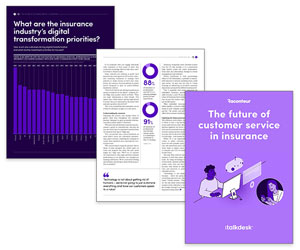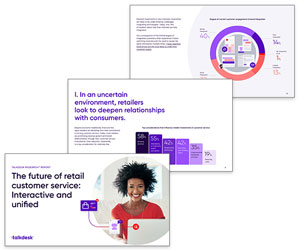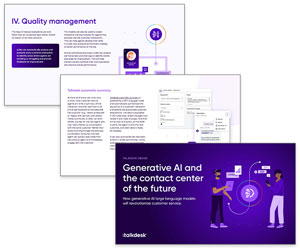Short of staff, but want to improve your customer service? Maybe you should follow the example of Dell and Royal Mail and get your customers to do it for you.
Alex Coxon investigates the new phenomenon of Crowdsourcing.
Over the past six years, online communities and the practice of social networking have proliferated. Meanwhile the volume of online communities that exist in the form of chat groups and forums has grown so quickly that it has become almost impossible to calculate their number.
Using social networks and communities to improve the service offering
The most forward-thinking organisations aren’t just targeting social networks and online communities to gather opinions, of course. They’re also exploiting them to collect ideas for improvement and to learn from online networkers who are happy to share the expertise they have accumulated on certain products or services with those who are less knowledgeable.
The technical term for the collection of this information is ‘crowdsourcing’ – a portmanteau of the words ‘crowd’ and ‘outsourcing’ invented by journalist Jeff Howe in 2006 to describe how organisations can take advantage of public expertise by ‘outsourcing’ tasks to them that have traditionally been performed in-house or by a contractor.
Put simply, crowdsourcing enables organisations to find solutions to certain problems through online communities and social networks, rather than having to undertake expensive research internally. This might be achieved directly through the creation of a bespoke forum, where the organisation can direct specific questions to a registered online community of users or customers. It may also be achieved indirectly if an organisation chooses to trawl through ‘open’ social networks such as Facebook, Twitter or LinkedIn to find out what the public is saying about them – and, in particular, what suggestions and advice they are offering to their peers.
Some real-life examples
Dell using expert customers
Companies that are actively embracing the concept of crowdsourcing include the likes of computer firm Dell, which offers customers an online ‘support forum’ to help them find answers to specific technical questions. Interestingly, this forum is populated by both staff and members of the public. In other words, Dell is happy to let ‘expert customers’ provide technical assistance to their peers – albeit under the watchful eye of staff members, who are on hand to correct any inaccurate postings.
Other companies are going further still and actually rewarding members of the public for their participation or advice-giving.
Royal Mail
Royal Mail, for example, has an ‘opinion forum’, encouraging individual and corporate customers to offer up their views on the service and provide suggestions for improvement. In return for every interaction, the company donates 50 pence to its partner charity Barnado’s. Participants are also automatically entered into a prize draw to win £100.
Mobile
Another company, meanwhile, has introduced a tempting offer for tech-savvy members of the public willing to share their knowledge on handset faults and fixes with less informed peers. For every post they make on the telecoms provider’s forum, they are rewarded with a point. Extra points are then allocated for every post marked ‘helpful’ by another forum member or the moderator, and more points still are distributed for posts that solve a specific problem.
At the end of every month, the points are totted up and three prizes are allocated: a first prize of either a month’s free line rental or top-up credit to the value of £35; a second prize of 30 days unlimited SMS usage; and a third prize of unlimited mobile internet. The cost of offering such prizes is almost negligible. But for the ‘expert customer’, the potential worth is great.
What this means for call centre operators
It is clear from the examples above that crowdsourcing can have a positive impact on an organisation’s service offering. Some businesses use it simply as a means of finding out what consumers think of them, and what changes those consumers believe should be made to enhance products or customer service. Others use crowdsourcing to unearth ‘expert customers’ and exploit their expertise for the benefit of others.
Reducing call volumes
The practical implications of this are vast; organisations that get the right information out into the public domain using social networks and online communities will not only reduce the volume of calls coming into their contact centres, but could also cut their costs by not having to employ so many expert advisors in-house.
How to get involved
So, we know the benefits. But what can organisations do if they want to start engaging in crowdsourcing? Where should they begin?
According to Dominic McNeillis, AMEA product marketing manager for the software tool Confirm at Pitney Bowes Business Insight (PBBI), the first step is to research the different social media and online communities relevant to the organisation in question.
“You shouldn’t dive in before you understand what you’re dealing with. Investigate the platforms you’re interested in [for example, Facebook, LinkedIn or online forums] and look at how they’re being used,” he says. “Then look for examples from multiple industries – not just your own. The lateral thinker is the clever thinker. Be a magpie; be a thief. Find out from other organisations what platforms work best for them when crowdsourcing, why and how, then take on board some of their best ideas.”
It is important, says Ian Rawlings, marketing director, AMEA, at technology provider eGain, to have a robust strategy around crowdsourcing. So the next step, he argues, is to take an honest look at what you can and can’t do.
“It doesn’t matter if you choose to reward participants or not: if you go to the trouble of collecting information, but ignore the feedback you’re given, you can damage your brand,” he states.
After that, says James Prebble, director of digital strategies at marketing agency Pancentric, you need to action the feedback you receive.
“Try not to promise specific timelines; you need time to digest ideas and work out how you’re going to change things,” he says. “But do keep your audience informed through periodic updates – perhaps monthly – in an appropriate place: perhaps on your ‘fan page’ [on your website], on your LinkedIn page, or on your customer forum.”

Alex Coxon
Finally, consider how to make best use of the information you gather. If you’re using crowdsourcing to bring in ‘expert customers’ to advise others, for example, don’t just leave their valuable input on a forum page that might not be easy to access.
Conclusion: the future of crowdsourcing
There is little doubt that crowdsourcing will continue to flourish as a medium.
“Personally, I think [crowdsourcing] will become mainstream and a vital part in customer service strategies over the next 12 to 24 months,” concludes Ian Rawlings.
Alex Coxon is a freelance journalist and a former editor of both Call Centre Helper and Call Centre Focus.
What are your views on crowdsourcing? Please leave your comments in an email to Call Centre Helper..
Author: Jo Robinson
Published On: 3rd Nov 2010 - Last modified: 22nd Nov 2017
Read more about - Customer Service Strategy, Customer Service, Social Media





















There is little doubt that crowdsourcing is a growing phenomenon in business and some might argue, a disruptive innovation. Two clear benefits are the speed of completion of non-automated tasks and the cost-effectiveness of the process. The crowdsourcing landscape in the US is expanding rapidly and new companies are now emerging in Europe.